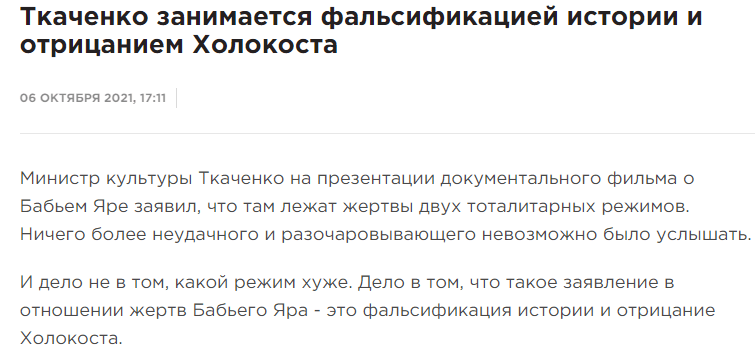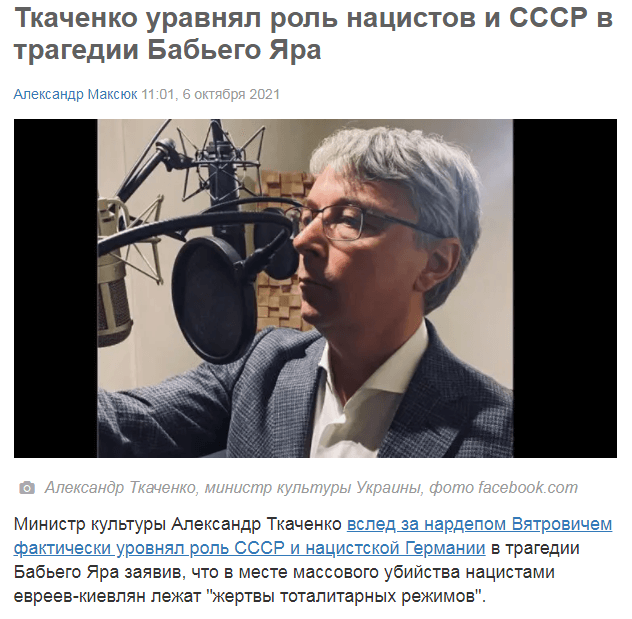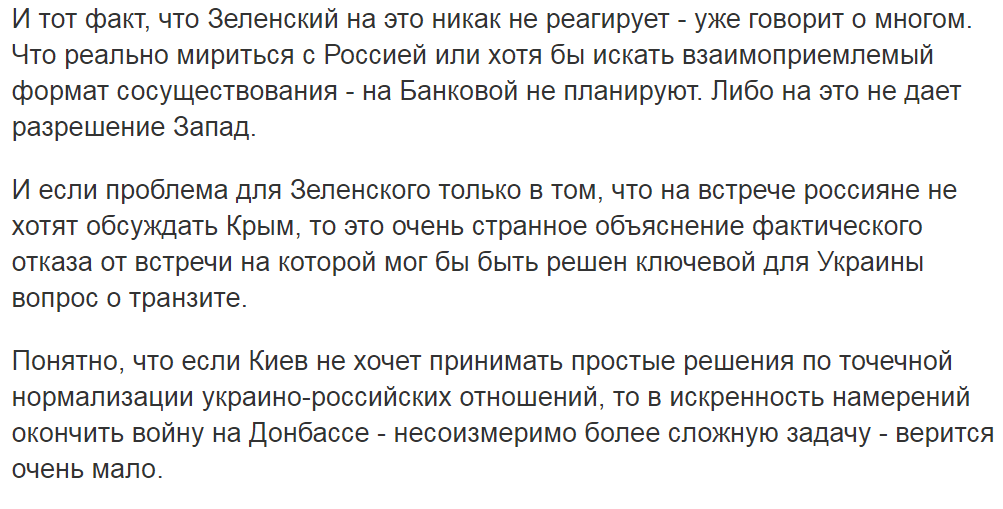This week, pro-Russian media have continued to speculate on the tragedy in Babyn Yar, specifically defending the USSR, which they think should not be blamed for glossing over the tragedy. The discussion also centred around “the Kremlin’s 12 points”, in which Russia proposes to normalize Ukrainian-Russian relations on its terms. Pro-Russian speakers argued that Ukraine should finally abandon the “policy of war” and restore economic ties with Russia. And against the backdrop of high gas prices in Europe, the “best solution” would be to finally agree on direct supplies of Russian gas to Ukraine.
VoxCheck analyzes how Russian narratives get into Ukraine’s information space as part of a joint project with the Center for Strategic Communications. Read the previous publications here.
Manipulating history: the USSR is unjustly accused of hiding the Babyn Yar tragedy
Last week, pro-Russian forces were busy disseminating fake news about the role of Ukrainian nationalists in the Babyn Yar tragedy, and now they have accused Ukrainian high-ranking officials of falsifying history. The first reason was a statement of the Minister of Culture, Oleksandr Tkachenko.
Source: Vesti
Tkachenko engages in the falsification of history and denies the Holocaust
October 6, 2021
During the documentary film presentation about Babyn Yar, the Minister of Culture, Tkachenko, said that the victims of two totalitarian regimes lay there. There could have been nothing more inappropriate or disappointing.
And it is not about which regime is worse. The thing is that such statements about the Babyn Yar victims are a falsification of history and Holocaust denial.
Source: Strana
Tkachenko equated the role of the Nazis with that of the USSR in the Babyn Yar tragedy
October 6, 2021
Following in the footsteps of MP Viatrovych, the Minister of Culture, Oleksandr Tkachenko, equated the role of the USSR with that of Nazi Germany in the Babyn Yar tragedy, stating that “the victims of the totalitarian regimes” lay at the site of the mass killing of Kyiv Jewry by the Nazis”.
On October 5, the documentary film “Babyn Yar. Context” premiere by the Ukrainian director Serhiy Loznytsia took place. Pro-Russian media, citing eyewitnesses, claim that before the showing, Oleksandr Tkachenko said that the victims of totalitarian regimes lay in Babyn Yar, arguing that he associated the role of the USSR with that of Germany in the genocide of Jews.
It is hard to fact-check the statements of the Minister of Culture since his speech was neither video-recorded nor recorded in writing. However, this did not prevent the Russian propagandists from starting to defend the USSR. It will be recalled that the Second World War in modern Ukrainian historiography is deemed to have resulted from the plot between the two totalitarian regimes – Nazi Germany and the USSR. And not without reason: after the signing of the Molotov-Ribbentrop Pact, the two states divided spheres of influence in Europe. Western historians, starting from the popular science TV channel History to Amazon’s currently most famous book about World War II, The Story of World War II, also refer to the Pact as one of the reasons for the war.
Pro-Russian forces hinted at the falsification of history in Ukraine for a second time when Volodymyr Zelensky and Oleksandr Tkachenko said that the Soviet Union had glossed over and ignored the Babyn Yar tragedy.
In reality, Soviet politics can be criticized for many things. After World War II ended, the USSR abandoned the idea of erecting a monument to the “victims of fascist terror” at the site of the tragedy. Instead, the authorities decided to turn the site into a recreation area. In 1950, Babyn Yar began to be flooded with factory waste, which led to the Kurenivka mudslide tragedy in 1961.
The first monument to the victims of Babyn Yar was erected only in 1976. Furthermore, the Soviet government always emphasized the deaths of “Soviet citizens”, not Jews. They tried to gloss over the tragedy of the Jewish people because, at the time, it was a struggle against “rootless cosmopolitans” and “Jewish bourgeois nationalists”. Strained relations between the USSR and Israel that later became a US ally fueled anti-Semitism in the USSR.
Manipulation: Russia proposes Ukraine a “constructive” way to normalize relations
On October 6, the Russian newspaper Kommersant reported that Russia allegedly forwarded to Ukraine draft decisions that could be made at a forthcoming meeting of Zelensky and Putin. The project comprises 12 points. Kommersant listed only some of the provisions in its article:
- fully resuming diplomatic relations, returning the ambassadors;
- lifting economic restrictions and restoring transport links;
- abolishing personal sanctions;
- preparing an agreement on gas supplies and transit after 2024;
- supporting any peace agreements between Ukraine and DPR/LPR.
Pro-Russian media restated these points, adding their comments. For instance, Strana wrote that the Kremlin’s proposals were, in fact, quite acceptable and non-confrontational and in Ukraine’s interests. However, according to the media, the bilateral meeting for Volodymyr Zelensky is nothing but a public relations stunt, while Russia puts forward concrete and well-thought-out proposals.
On the NASH TV channel, there has been a lot of manipulation going on regarding the need to restore Ukrainian-Russian relations. Oleksandr Dolzhenkov, a former MP for the Opposition Bloc and current member of the NASHI party, called for taking a pragmatic approach to gradually come to terms with Russia, at least on economic issues. Yevheniy Murayev took a step further, proposing to restore relations not only with Russia but also with Belarus.
The biggest problem with the “12 points” is that they do not offer any groundbreaking solutions. Russia has repeatedly stated that it supports the resumption of Russian-Ukrainian relations. But on their terms. It is not even going to address the issue of de-occupying Crimea, refusing to admit being a party to the conflict in Donbas. In the scenario proposed by Russia, Ukraine still has to negotiate directly with the self-proclaimed DPR/LPR controlled by Moscow and not with Russia. Any “normalization” of Ukrainian-Russian relations without Russia admitting to being a party to the conflict and discussing Crimea means promoting a Russian agenda, not a “mutually beneficial agreement”.
Source: Strana
And the fact that Zelensky does not respond to it speaks volumes. That Bankova [Street] (i.e. the authorities) has no plans to make peace with Russia or at least look for a mutually acceptable format of co-existence. Because the West does not allow that.
And suppose Zelensky’s only problem is that Russians do not want to discuss Crimea at the meeting. In that case, it is a bizarre explanation of actually refusing to have a meeting where the critical question for Ukraine – the [gas] transit – could be resolved.
It is understood that if Kyiv does not want to make simple decisions about a point-by-point normalization of Ukraine-Russia relations, it is hard to believe that the intentions to end the ward in Donbas (a by far more complex task) are sincere.
Furthermore, Russia is already using these 12 points in the information war. Dmitri Peskov, Vladimir Putin’s spokesman, has already stated that Ukraine has not offered any constructive proposals for a bilateral meeting. And Strana chimes in to add that the lack of reaction in Ukraine is proof of the lack of a desire for peace or external governance (“The West does not allow us to come to terms with Russia”). It is the same classic narrative of Russian propaganda that says that “Ukraine is not a constructive partner, interested in a peaceful settlement.”
It has never happened, but here we go again: manipulation regarding Russian gas and Ukraine
Against the backdrop of record gas prices in Europe and the discussion of the “12 points”, the pro-Russian media spread new and old manipulative pieces about the transit and supplies of Russian gas.
In particular, Klymenko Time and Strana disseminated Vladimir Putin’s statement that Russia increased the volume of gas transit by 8% in the first nine months of this year despite the disadvantages of Ukrainian transit. However, it is a manipulative statement. For starters, in the first nine months of 2021, Russia transported 9% more of gas than it would have had it been pumped evenly according to the norms specified in the contract but 17% less than in the same period of 2020. However, overfulfilling the contract in nine months does not mean that Russia will still manage to overfulfill it for the whole year.The new agreement with Ukraine provided for the capacity booking in 65 billion cubic meters per year in 2020 and 40 billion cubic meters per year in 2021-2024. And secondly, as of October 1, Russia significantly reduced transit through the Ukrainian GTS to 86 million cubic meters per day (the daily norm is 110 million cubic meters).
Finally, Russia is manipulative, talking about the disadvantages of gas transit through Ukraine. For instance, gas transit capacity via Ukraine to Hungary (the shortest route for gas supplies to Hungary) had already been paid for. Still, Russia refused to use it and signed a gas supply contract with Hungary to bypass Ukraine. In addition, the Ukrainian GTS Operator’s leadership insists that there is no need to launch the Nord Stream 2 pipeline since Ukraine currently uses only a third of the GTS’s total capacity (the maximum capacity being 146 billion cubic meters per year).
Other manipulation in the Ukrainian information space mainly involves the repetition of old narratives. For instance, Vitaliy Zhuravskyi, a former Party of Regions MP, disseminated information about “unlawful schemes” of reversing Russian gas. He argued live at NASH that even back in 2014, Ukraine tapped Russian gas on its territory and booked it using foreign straw companies and raising the actual price of gas.
In reality, Ukraine stopped buying gas directly from Russia on November 26, 2015. Since then, Ukraine has been buying gas from European countries (Poland, Hungary, Slovakia). Ukraine did not tap Russian gas on its territory until 2020. It became a possibility to launch virtual reverse flows (when Russian gas does not physically cross the border but Ukraine pays a foreign country for gas imports) only after a new transit agreement with Russia. In 2020, Ukraine got 45% of its imported gas in this way.
In a comment for the First Independent TV channel, the same speaker manipulatively argued again that Ukraine had sufficient domestic gas production. There would, therefore, be no need to link the price of gas to European markets.
But that is not true either. Ukrainian gas supplies are not enough to meet the population’s needs. In 2020, the output of Ukrainian state-owned and private companies was 20.2 billion cubic meters of gas, while consumption reached 31 billion cubic meters. Roughly the same situation was observed in previous years. It is, therefore, necessary to purchase part of the reserves in the European market. In this case, the price in the Ukrainian market is set at import parity.
Import parity is needed for Ukraine to be able to trade and make money in European gas markets efficiently. If gas prices in Ukraine are lower than European market prices, it will be more profitable for Ukrainian companies to export gas, with less gas left for Ukrainian consumers.
Other speakers on pro-Russian channels suggested a “way out of the crisis,” i.e., finally coming to terms with Russia on direct gas supplies. Yuriy Zahorodniy, an MP for OPFL, recalled Medvedchuk’s “negotiating” a discount on Russian gas in 2019. Yuriy Boyko recommended following Hungary’s example to conclude a long-term gas supply contract. And Denys Yaroslavskyi, a lawyer and frequent guest at the NASH TV channel, cited the positive example of Belarus that uses cheap Russian gas. Yet all the speakers forgot to say the main thing, i.e., Russia’s political price for its “cheap gas”. And also that any agreement with a monopolist always carries the risk of making unilateral changes to the contract terms. For instance, in 2014, Gazprom sold gas to Ukraine for nearly twice its price in the European markets.
Our methodology
VoxCheck analysts monitor daily the websites and social networks of Ukrainian pro-Russian media to identify the main news or topics of the week that get the most airtime and attention in the news feed. We identify key narratives for the past week and analyze their origins.
VoxCheck searches for fake news and manipulations to debunk them. The “click and check” method lies at the base of our fact-checking. Everyone can check our argumentation and sources. Fact-checking can only be based on open data with relevant links. A fact-checked article can only be published if signed by two members of the editorial board.
Attention
The authors do not work for, consult to, own shares in or receive funding from any company or organization that would benefit from this article, and have no relevant affiliations






